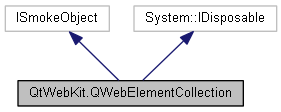|
Qyoto
4.0.5
Qyoto is a C# language binding for Qt
|
|
Qyoto
4.0.5
Qyoto is a C# language binding for Qt
|
The QWebElementCollection class represents a collection of web elements. More...


Classes | |
| class | const_iterator |
| class | iterator |
| The QWebElementCollection::iterator class provides an STL-style iterator for QWebElementCollection. More... | |
Public Member Functions | |
| QWebElementCollection () | |
| | |
| QWebElementCollection (QWebElementCollection arg1) | |
| | |
| QWebElementCollection (QWebElement contextElement, string query) | |
| | |
| virtual void | CreateProxy () |
| new void | Append (QWebElementCollection collection) |
| | |
| new QWebElement | At (int i) |
| | |
| new QWebElementCollection.const_iterator | Begin () |
| | |
| new QWebElementCollection.const_iterator | ConstBegin () |
| | |
| new QWebElementCollection.const_iterator | ConstEnd () |
| | |
| new int | Count () |
| | |
| new QWebElementCollection.const_iterator | End () |
| | |
| new QWebElement | First () |
| | |
| new QWebElement | Last () |
| | |
| new System.Collections.Generic.List < QWebElement > | ToList () |
| | |
| new void | Dispose () |
Static Public Member Functions | |
| static QWebElementCollection | operator+ (QWebElementCollection arg1, QWebElementCollection arg2) |
| | |
Protected Member Functions | |
| QWebElementCollection (System.Type dummy) | |
Protected Attributes | |
| SmokeInvocation | interceptor |
Properties | |
| virtual System.IntPtr | SmokeObject [get, set] |
The QWebElementCollection class represents a collection of web elements.
Elements in a document can be selected using QWebElement::findAll() or using the QWebElement constructor. The collection is composed by choosing all elements in the document that match a specified CSS selector expression.
The number of selected elements is provided through the count() property. Individual elements can be retrieved by index using at().
It is also possible to iterate through all elements in the collection using Qt's foreach macro:
QWebElementCollection collection = document.findAll("p");
foreach (QWebElement paraElement, collection) {
...
}
|
protected |
| QtWebKit.QWebElementCollection.QWebElementCollection | ( | ) |
Constructs an empty collection.
| QtWebKit.QWebElementCollection.QWebElementCollection | ( | QWebElementCollection | arg1 | ) |
Constructs a copy of other.
| QtWebKit.QWebElementCollection.QWebElementCollection | ( | QWebElement | contextElement, |
| string | query | ||
| ) |
Constructs a collection of elements from the list of child elements of contextElement that match the specified CSS selector query.
| new void QtWebKit.QWebElementCollection.Append | ( | QWebElementCollection | collection | ) |
Extends the collection by appending all items of other.
The resulting collection may include duplicate elements.
See also operator+=().
| new QWebElement QtWebKit.QWebElementCollection.At | ( | int | i | ) |
Returns the element at index position i in the collection.
| new QWebElementCollection.const_iterator QtWebKit.QWebElementCollection.Begin | ( | ) |
Returns an STL-style iterator pointing to the first element in the collection.
See also end().
| new QWebElementCollection.const_iterator QtWebKit.QWebElementCollection.ConstBegin | ( | ) |
Returns an STL-style iterator pointing to the first element in the collection.
See also end().
| new QWebElementCollection.const_iterator QtWebKit.QWebElementCollection.ConstEnd | ( | ) |
Returns an STL-style iterator pointing to the imaginary element after the last element in the list.
See also begin().
| new int QtWebKit.QWebElementCollection.Count | ( | ) |
Returns the number of elements in the collection.
|
virtual |
| new void QtWebKit.QWebElementCollection.Dispose | ( | ) |
| new QWebElementCollection.const_iterator QtWebKit.QWebElementCollection.End | ( | ) |
Returns an STL-style iterator pointing to the imaginary element after the last element in the list.
See also begin().
| new QWebElement QtWebKit.QWebElementCollection.First | ( | ) |
Returns the first element in the collection.
See also last(), operator[](), at(), and count().
| new QWebElement QtWebKit.QWebElementCollection.Last | ( | ) |
Returns the last element in the collection.
See also first(), operator[](), at(), and count().
|
static |
Returns a collection that contains all the elements of this collection followed by all the elements in the other collection. Duplicates may occur in the result.
See also operator+=().
| new System.Collections.Generic.List<QWebElement> QtWebKit.QWebElementCollection.ToList | ( | ) |
Returns a QList object with the elements contained in this collection.
|
protected |
|
getset |